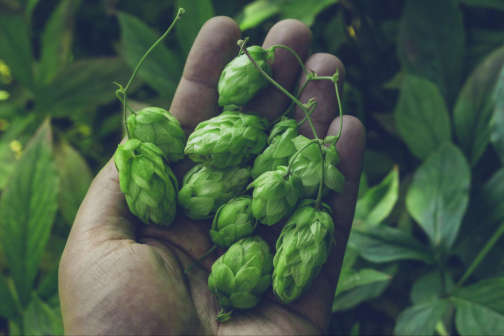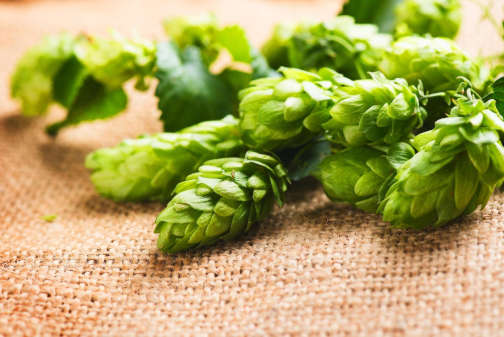Crafts beers now account for nearly one-quarter of the beer market in the United States, and this figure is only expected to increase in the years ahead. The Hop Wars continue as microbreweries and macro breweries alike both look to enhance the flavor profiles of their products, while also streamlining production and maximizing brew kettle efficiency. With this in mind, it’s important to realize that whole leaf dried hops, due to their natural absorbency, can result in an estimated brew kettle volume loss of approximately 25 percent. Hop extract, on the other hand, allows operations of all sizes, from homebrew maestros to brewery behemoths, a convenient, clean, and affordable way to minimize product loss without sacrificing the aromatics and flavor bouquet of the final product.
At one point in time, supercritical CO2 hop extract was seen as a cost-saving measure feasible only for large-scale operations, but that is certainly no longer the case. Supercritical CO2 extraction was first introduced into the craft brewery scene nearly two decades ago. Not long after Russian River Brewing Company announced that it had used CO2 hop extract rather than traditional pellets in its Pliny the Elder beer, other small-batch breweries soon followed suit. So, what is hop extract, and how is it extracted? Let’s take a look…
The Basics: What Is Hop Oil? What Is Hop Extract?
As any beer connoisseur, or even the most casual of quaffers, is probably aware, hops are the cone-shaped flowers of the hop plant. These flowers are used to brew many popular varieties of beer. Hops are incorporated during the brewing process in two main forms: whole hops and pellets. Whole hops, also known as raw hops, are exactly what they sound like: the whole conical hop flower. Pellets, also known as “hop plugs,” are made of hop flowers that have been ground and then compressed. Many brewers choose to use these dense pellets to save valuable space in their brewing operations, thereby making more room for beer storage. Either whole leaf hops or hop pellets can be used to produce hop extract. Hop extract retains the α-acids, β-acids and hop oils of the whole flower. Hop oils are responsible for creating beer’s unique aromas, bitterness, and diverse flavor profiles. The most prominent hop oils include myrcene, caryophyllene, humulene, and farnesene.
Once a brewer decides to start using hop extract and hop oil, there are myriad production methods to consider. Which extraction method will work best for a given operation depends on several factors, including operational limitations and the desired final product.
How to Extract Hop Oil
There are several popular ways to produce hop extract and hop oil from plant material, ranging from steam distillation to supercritical CO2 extraction. During steam distillation, steam is allowed to pass through a chamber or container holding the plant material (in this case, hops). As the steam moves through the plant material, the essential hop oils are vaporized. Next, the vapor and remaining steam are collected in a separate container to cool. Once adequately cooled, the essential oils and water can be easily separated. Solvent-based extraction methods are also popular in many areas of the food and beverage industry, including brewing. However, while solvents such as butane can be used to create hop extract, these more volatile solvents come with their own set of risks and considerations, including the challenge of purging them completely from the extract to produce a safe final product. This is why supercritical CO2 extraction has become the industry standard for premium hop extract and hop oil.
Supercritical CO2 Hop Extract: What Is Supercritical Extraction?
Supercritical extraction has been a staple tool of the food and beverage industry for years. Nontoxic supercritical CO2 is also widely used to produce hop extract and hop oil, due to the relative safety, ease, and environmental friendliness of the extraction process. Before diving into the details of how to make hop oil extract, it’s helpful to understand the basics of supercritical CO2 extraction. This process is possible because supercritical CO2 is tunable, meaning it can be modified to focus on extracting a particular product, such as hop oil. It takes the perfect balance of temperature and pressure to tune the CO2 to achieve maximum extraction efficiency, and this perfect balance varies depending on the compound being extracted.
As tricky as that might sound, CO2 hop extraction starts with a relatively simple setup. The SuperC utilizes an extraction vessel and dual syringe piston compressor to bring CO2 to its supercritical state and apply it to the hops or other desired source material. First, the plant material (in this case whole leaf hops or hop pellets) is placed in an extraction column. Then, in a separate compartment, an internal compressor and heating element are used to increase both the pressure and the heat. This allows the CO2 to reach its supercritical state, in which the CO2 maintains many properties of both a liquid and a gas. Supercritical CO2 has the ability to pass through the plant material like a gas while also dissolving materials like a liquid. Next, the supercritical CO2 hop extract mixture flows into a collection jar, where a sudden reduction in pressure from the material column to the collection jar causes the hop extract to separate from the CO2.
Benefits of CO2 Hop Extract and Hop Oil
It’s important to remember that each extraction method comes with its own advantages and disadvantages to consider. Some of the major benefits of using CO2 hop extract, as opposed to whole leaf hops or pellets, come down to quality control and space efficiency. CO2 hop extract has a shelf life years longer than that of whole leaf hops or hop pellets, and it does not require refrigeration during storage. This combination of factors makes CO2 hop extract an enticing brewing option for both small and large-scale operations looking for low-maintenance storage solutions. Of course, there is a cost to the extraction process. However, as Jeremy Kosmicki, a representative of Founders Brewing, explains in a recent interview with Imbibe Magazine, the amount of space saved in the brew kettle as a result of using CO2 hop extract will easily absorb these costs and then some, by allowing brewers to brew more beer per batch.
Historically, both the craft market and the high-end market have been averse to using anything other than traditional hops or hop pellets during the brewing process. The fear is that hop extracts may alter the aroma and flavor profiles of the end product, and this does seem to be the case with steam distillation. However, Kosmicki notes that Founders Brewing, for one, has invested in various sensory panels to determine whether even the most refined pallets could sniff out the difference between a product created using whole leaf hops and one made with CO2 hop extract. Results suggest that, from a flavor profile perspective, products using hop extracts are virtually “indistinguishable” from whole cone products.
As small microbreweries and homebrewers look to improve their products and reduce waste, hop extracts are no longer reserved for the macro breweries of the world. Hop extract offers operators an efficient way to tune the aromatics and flavor profiles of their products without skimping on quality. Today, supercritical CO2 extraction remains the optimal method of yielding the purest hop resin and hop extract. For brewers in the market for an affordable, efficient tabletop extraction machine engineered to give operators maximum control and acute precision with every extraction, look no further than OCO Labs Modular Tabletop Extractors. Our Modular Tabletop Extractors are designed to be easy-to-use and safe for any operation, providing you with precise control over every run. With our hop extraction products, you can cater confidently to the craft beer market and more!
We update our blog regularly so stay tuned for the latest on CO2 hop oil extraction and supercritical co2 hop extract and much more!







